 Libri di Barash David P. su Unilibro.it
)
Libri di Barash David P. su Unilibro.it
)
|
|
1918 |
 Title :
Strength Through Peace
Title :
Strength Through PeaceAuthor: Lipton Judith Eve M.D., Barash David P. Ph.D. Publisher: Oxford Univ Pr € 34,00
|
 Title :
Through a Glass Brightly
Title :
Through a Glass BrightlyAuthor: Barash David P., Constant Charles (NRT) Publisher: Highbridge Co € 27,70
|
|
1917 |
 Title :
Peace & Conflict Studies
Title :
Peace & Conflict StudiesAuthor: Barash David P., Webel Charles P. Publisher: Sage Pubns € 132,80
|
|
|
2009 |
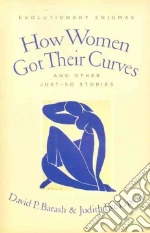 Title :
How Women Got Their Curves and Other Just-so Stories
Title :
How Women Got Their Curves and Other Just-so StoriesAuthor: Barash David P., Lipton Judith Eve Publisher: Columbia Univ Pr So how did women get their curves? Why do they have breasts, while other mammals only develop breast tissue while lactating, and why do women menstruate, when virtually no other beings do so? What are the reasons for female orgasm? Why are human females kept in the dark about their own time of ovulation and maximum fertility, and why are they the only animals to experience menopause? David P. Barash and Judith Eve Lipton, coauthors of acclaimed books on human sexuality and gender, discuss the theories scientists have advanced to explain these evolutionary enigmas (sometimes called "Just-So stories" by their detractors) and present hypotheses of their own. Some scientific theories are based on legitimate empirical data, while others are pure speculation. Barash and Lipton distinguish between what is solid and what remains uncertain, skillfully incorporating their expert knowledge of biology, psychology, animal behavior, anthropology, and human sexuality into their entertaining critiques. Inviting readers to examine the evidence and draw their own conclusions, Barash and Lipton tell an evolutionary suspense story that captures the excitement and thrill of true scientific detection. € 31,90
|
|
|
2007 |
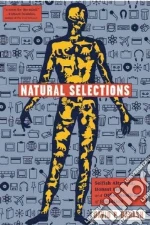 Title :
Natural Selections
Title :
Natural SelectionsAuthor: Barash David P. Publisher: Consortium Book Sales & Dist Through a series of essays, the author discusses the conflict between cultural and biological evolution, covering intelligent design, gender differences, and the meaning of life while offering insight into the ethical aspects of civilization. € 22,30
|
|
|
2006 |
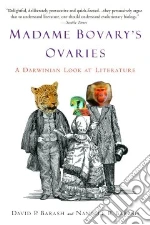 Title :
Madame Bovary's Ovaries
Title :
Madame Bovary's OvariesAuthor: Barash David P., Barash Nanelle R. Publisher: Delta What can elephant seals tell us about Homer's Iliad? How do gorillas illuminate the works of Shakespeare? What do bloodsucking bats have to do with John Steinbeck? Madame Bovary's Ovaries A Darwinian Look at Literature According to evolutionary psychologist David Barash and his daughter Nanelle, the answers lie in the most important word in biology: evolution. Just like every animal from mites to monkeys, our day-to-day behavior has been shaped by millions of years of natural selection. So it should be no surprise to learn that the natural forces that drive animals in general and Homo sapiens in particular are clearly visible in the creatures of literature, from Henry Fielding's Tom Jones all the way to Helen Fielding's Bridget Jones. Seen through the lens of evolutionary biology, the witty repartee of Jane Austen's courting couples, Othello's tragic rage, the griping of Holden Caulfield, and the scandalous indiscretions of Madame Bovary herself all make a fresh and exciting kind of sense. The ways we fall in—and out—of love, stand by our friends, compete against our enemies, and squabble with our families have their roots in biological imperatives we share not only with other primates but with an amazing array of other creatures. The result is a new way to read, a novel approach to novels (and plays) that reveals how human nature underlies literature, from the great to the not-so-great. Using the cutting-edge ideas of contemporary Darwinism, the authors show how the heroes and heroines of our favorite stories have been molded as much by evolution as by the genius of their creators, revealing a gallery of characters from Agamemnon to Alexander Portnoy, who have more in common with birds, fish, and other mammals than we could ever have imagined. As engaging and informative as a good story, Madame Bovary's Ovaries is both an accessible introduction to a fascinating area of science and a provocatively sideways look at our cherished literary heritage. Most of all, it shows in a delightfully enteraining way how science and literature shed light on each other. € 15,20
|
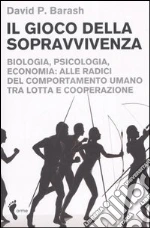 Title :
Il gioco della sopravvivenza. Biologia, psicologia, economia: alle radici del comportamento umano tra lotta e cooperazione
Title :
Il gioco della sopravvivenza. Biologia, psicologia, economia: alle radici del comportamento umano tra lotta e cooperazioneAuthor: Barash David P. Publisher: Orme Editori Gli esseri umani, come gli altri animali cooperano o si combattono per il cibo, il controllo del territorio, la propria sicurezza. Ma cosa li spinge a mostrare i muscoli o a fare gioco di squadra con i loro rivali? In questo libro, l'autore, psicologo all'Università di Washington (Seattle) e zoologo, sintetizza le più recenti idee partorite dalla biologia, dalla psicologia e dalle scienze economiche per esplorare le radici del nostro comportamento. Gettando finalmente un po' di luce su ciò che rende le nostre decisioni così squisitamente "umane" e su ciò che possiamo apprendere dal mondo naturale in cui viviamo per negoziare e competere tutti i giorni con i nostri simili. € 18,00
|
|
2002 |
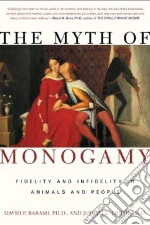 Title :
The Myth of Monogamy
Title :
The Myth of MonogamyAuthor: Barash David P., Lipton Judith Eve Publisher: Henry Holt & Co Applying new research to sex in the animal world, esteemed scientists David P. Barash and Judith Eve Lipton dispel the notion that monogamy comes naturally. In fact, as The Myth of Monogamy reveals, biologists have discovered that for nearly every species, cheating is the rule -- for both sexes. Reviewing findings from the same DNA fingerprinting science employed in the courtroom, Barash and Lipton take readers from chickadee nests to chimpanzee packs to explain why animals cheat. (Some prostitute themselves for food or protection, while others strive to couple with genetically superior or multiple mates.) The Myth of Monogamy then illuminates the implications of these dramatic new findings for humans, in our relationships, as parents, and more. The Myth of Monogamy at last brings scientific insight into this emotionally charged aspect of the ultimate dating and marriage quandary. € 18,50
|
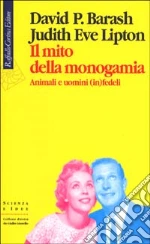 Title :
Il mito della monogamia. Animali e uomini (in)fedeli
Title :
Il mito della monogamia. Animali e uomini (in)fedeliAuthor: Barash David P.; Lipton Judith E. Publisher: Raffaello Cortina Editore In questo libro David Barash e Judith Lipton fanno a pezzi l'ideale della monogamia sulla base delle molte evidenze che provengono dalle scienze dell'uomo ma anche dalle ricerche di zoologia comparata. Proprio nelle specie animali abitualmente ritenute monogamiche lo scambio dei partner è la regola, non l'eccezione. Ma allora, se la poligamia è la norma e la monogamia quasi un'aberrazione, com'è che grandi tradizioni e culture hanno potuto sviluppare questa bizzarra tendenza? Com'è che sofisticate filosofie hanno potuto presentare come "naturale" l'unicità del partner sessuale? Tra natura e cultura la sfida è ancora aperta. € 23,00
|